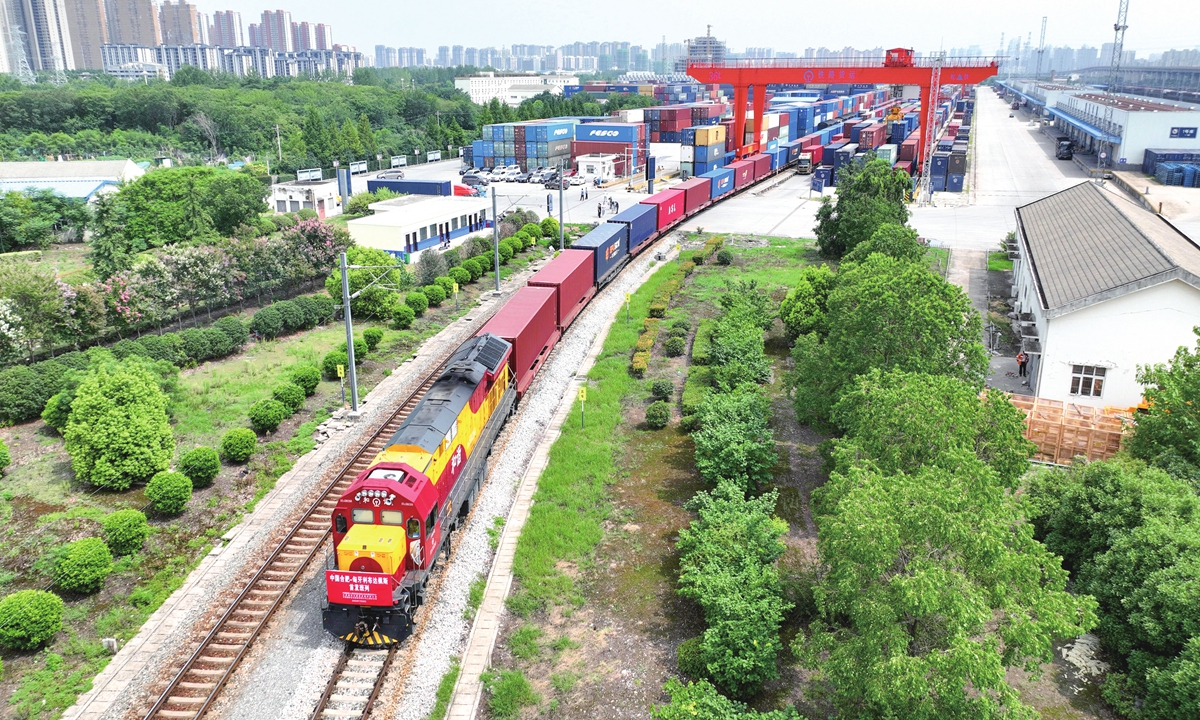
A China-Europe freight train departed from the logistics base of Hefei North Railway Station for Budapest, Hungary, on July 29, 2022. Photo: Xinhua
Last year marked the 75th anniversary of diplomatic relations between Hungary and China, and this year will mark the 50th anniversary of China-EU diplomatic ties. Hungary just ended its presidency of the Council of the EU in 2024, boosting European competitiveness. In the US, 2025 will bring new leadership as the Republican administration takes office in the White House. These milestones are worth commemorating. They will provide a good opportunity to assess the development and future of our relations.
Hungary aims to position itself as a key state of the new world order of the 21st century, aware of its relative size and 1,000-year history. This new world order will include an ever-emerging, stronger China. Strengthening ties between our two nations and fostering broader cooperation between the East and West presents a mutually beneficial opportunity. Hungary recognized this potential early, becoming the first EU country to join the Belt and Road Initiative in 2015. The stability of our bilateral relationship is ensured by the fact that the cooperation between our countries covers almost all sectors.
We believe in advancing connectivity and aspire to serve as a bridge between the regions. One example is the role we play in supporting the renewal of the European market. Major Chinese companies chose our country as their European headquarters or set up their regional headquarters here. Western manufacturers require electric batteries, and thanks to forward-thinking policies and investments in Hungary, battery parts can now move between neighboring factories of Eastern and Western companies. As the most modern technologies arrive, these investments contribute to the development of Hungary's competitiveness within Europe.
This is connectivity in action - we refer to this trade engagement as economic neutrality. Embracing dialogue and enhancing economic competitiveness will not only benefit Hungary but also contribute positively to the entire EU. A robust and well-established relationship between the EU and China brings significant advantages to the people on both sides, supporting economic growth.
Moreover, such a partnership contributes meaningfully to advancing global peace, ensuring stability and driving prosperity across the international community.
From a European and Hungarian perspective, Donald Trump's return to the White House signals a new dynamic. For Europe, these changes pose both challenges and opportunities. The "America First" policy will likely force Europe to address its strategic autonomy. It must adopt policies that bolster its own industries and navigate its relationship with the rising Asian world. In this evolving environment, Europe will need to reassert itself as a more independent global actor.
Currently, Europe is falling behind both China and the US. The continent is facing geopolitical tensions, insecurity of supply chains, rising energy prices and economic curbs. Asia's economies are growing four times faster compared to those of the West, and the global economic midway has shifted eastward.
With regards to the EU, critical opportunities were indeed missed in the past. In recent years, Europe has mishandled crises, with federal and ideology-driven institutions getting more power at the expense of member states. The will to win, the desire to succeed, the urge to reach full potential were missing. Centralization has hindered a more balanced and effective response to economic and structural issues. Hungary has long rung the alarm bells: We cannot rely on others to resolve our economic challenges. Action is required. An economically weak union cannot create peace, nor can it create prosperity and security.
When we discuss the future of Europe and our partnerships for the upcoming years, our shared responsibility and interest lie in encouraging rational and mutually beneficial relations between Hungary, China and the EU. Strong ties between Hungary and China demonstrate that a reciprocally advantageous economic and political partnership can be achieved, serving as a model for strengthening Europe's strategic autonomy and competitiveness in its engagement with China.
The author is the Head of the International Secretariat of Hungary's Fidesz party. opinion@globaltimes.com.cn




